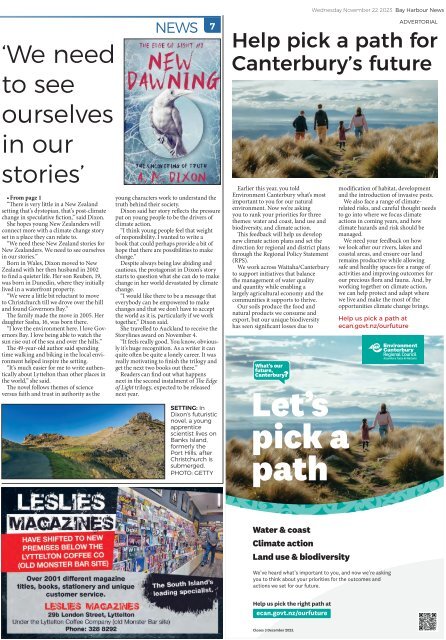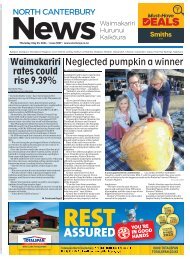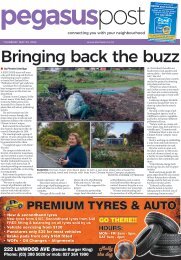Bay Harbour: November 22, 2023
Create successful ePaper yourself
Turn your PDF publications into a flip-book with our unique Google optimized e-Paper software.
‘We need<br />
to see<br />
NEWS 7<br />
Wednesday <strong>November</strong> <strong>22</strong> <strong>2023</strong> <strong>Bay</strong> <strong>Harbour</strong> News<br />
ADVERTORIAL<br />
ADVERTORIAL<br />
Help pick a path for<br />
Canterbury’s future<br />
ourselves<br />
in our<br />
stories’<br />
• From page 1<br />
“There is very little in a New Zealand<br />
setting that’s dystopian, that’s post-climate<br />
change in speculative fiction,” said Dixon.<br />
She hopes young New Zealanders will<br />
connect more with a climate change story<br />
set in a place they can relate to.<br />
“We need these New Zealand stories for<br />
New Zealanders. We need to see ourselves<br />
in our stories.”<br />
Born in Wales, Dixon moved to New<br />
Zealand with her then husband in 2002<br />
to find a quieter life. Her son Reuben, 19,<br />
was born in Dunedin, where they initially<br />
lived in a waterfront property.<br />
“We were a little bit reluctant to move<br />
to Christchurch till we drove over the hill<br />
and found Governors <strong>Bay</strong>.”<br />
The family made the move in 2005. Her<br />
daughter Sasha, 16, was born there.<br />
“I love the environment here. I love Governors<br />
<strong>Bay</strong>. I love being able to watch the<br />
sun rise out of the sea and over the hills.”<br />
The 49-year-old author said spending<br />
time walking and biking in the local environment<br />
helped inspire the setting.<br />
“It’s much easier for me to write authentically<br />
about Lyttelton than other places in<br />
the world,” she said.<br />
The novel follows themes of science<br />
versus faith and trust in authority as the<br />
young characters work to understand the<br />
truth behind their society.<br />
Dixon said her story reflects the pressure<br />
put on young people to be the drivers of<br />
climate action.<br />
“I think young people feel that weight<br />
of responsibility. I wanted to write a<br />
book that could perhaps provide a bit of<br />
hope that there are possibilities to make<br />
change.”<br />
Despite always being law abiding and<br />
cautious, the protagonist in Dixon’s story<br />
starts to question what she can do to make<br />
change in her world devastated by climate<br />
change.<br />
“I would like there to be a message that<br />
everybody can be empowered to make<br />
changes and that we don’t have to accept<br />
the world as it is, particularly if we work<br />
together,” Dixon said.<br />
She travelled to Auckland to receive the<br />
Storylines award on <strong>November</strong> 4.<br />
“It feels really good. You know, obviously<br />
it’s huge recognition. As a writer it can<br />
quite often be quite a lonely career. It was<br />
really motivating to finish the trilogy and<br />
get the next two books out there.”<br />
Readers can find out what happens<br />
next in the second instalment of The Edge<br />
of Light trilogy, expected to be released<br />
next year.<br />
SETTING: In<br />
Dixon’s futuristic<br />
novel, a young<br />
apprentice<br />
scientist lives on<br />
Banks Island,<br />
formerly the<br />
Port Hills, after<br />
Christchurch is<br />
submerged.<br />
PHOTO: GETTY<br />
Earlier this year, you told<br />
Environment Canterbury what’s most<br />
important to you for our natural<br />
environment. Now we’re asking<br />
you to rank your priorities for three<br />
themes: water and coast, land use and<br />
biodiversity, and climate action.<br />
This feedback will help us develop<br />
new climate action plans and set the<br />
direction for regional and district plans<br />
through the Regional Policy Statement<br />
(RPS).<br />
We work across Waitaha/Canterbury<br />
to support initiatives that balance<br />
the management of water quality<br />
and quantity while enabling a<br />
largely agricultural economy and the<br />
communities it supports to thrive.<br />
Our soils produce the food and<br />
natural products we consume and<br />
export, but our unique biodiversity<br />
has seen significant losses due to<br />
Let’s<br />
pick a<br />
path<br />
modification of habitat, development<br />
and the introduction of invasive pests.<br />
We also face a range of climaterelated<br />
risks, and careful thought needs<br />
to go into where we focus climate<br />
actions in coming years, and how<br />
climate hazards and risk should be<br />
managed.<br />
We need your feedback on how<br />
we look after our rivers, lakes and<br />
coastal areas, and ensure our land<br />
remains productive while allowing<br />
safe and healthy spaces for a range of<br />
activities and improving outcomes for<br />
our precious flora and fauna. And, by<br />
working together on climate action,<br />
we can help protect and adapt where<br />
we live and make the most of the<br />
opportunities climate change brings.<br />
Help us pick a path at<br />
ecan.govt.nz/ourfuture<br />
Water & coast<br />
Climate action<br />
Land use & biodiversity<br />
We’ve heard what’s important to you, and now we’re asking<br />
you to think about your priorities for the outcomes and<br />
actions we set for our future.<br />
Help us pick the right path at<br />
Closes 3 December <strong>2023</strong>.


















